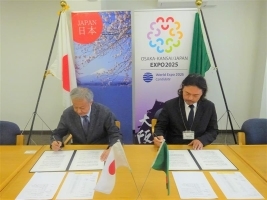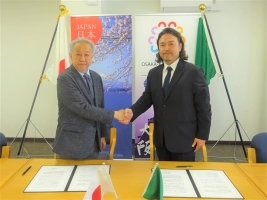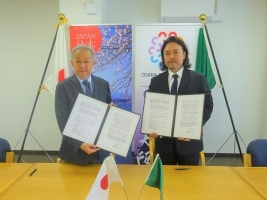Grant Contract Signed for “Promoting Basic Education in Meheba Refugee Settlement (Phase3)” under the Grant Assistance for Japanese NGO Projects
2025/7/14



On 14th July 2025, Ambassador TAKEUCHI Kazuyuki and Mr. YAMASHITA Shuichi, Acting Country Representative of the Association for Aid and Relief, Japan (AAR Japan), signed a grant contract amounting up to 645,035 US dollars for the project “Promoting Basic Education in Meheba Refugee Settlement (Phase3),” which is funded under the “Grant Assistance for Japanese NGO Projects.”
This three-year project aims to contribute to the expansion of basic education in Zambia by: (i) constructing secondary school facilities, (ii) providing training for primary and secondary school teachers, and (iii) offering adult literacy programs in the Meheba Refugee Settlement, located in North-Western Province.
In Zambia, many people continue to live below the poverty line, and basic social services such as education and healthcare remain insufficient, particularly in refugee communities and their host areas. Meheba Refugee Settlement, the largest of its kind in Zambia, hosts approximately 38,000 refugees, about 40% of whom, despite being of school-going age, are not enrolled in school. Since its establishment in 1971, the development of educational infrastructure in the settlement has been limited, with a particularly severe shortage of secondary education facilities. Local residents have long called for the construction of such facilities. This project is also aligned with SDG Goal 4 (“Ensure inclusive and equitable quality education for all”) and is consistent with the education support policy of TICAD8 and the refugee assistance policy of TICAD7.
As the final phase of the three-year initiative, this Year 3 project will build upon the facilities developed in the first and second years by adding a new classroom block, teachers’ housing, a science laboratory, girls’ toilets, a septic tank, and a deep well, aiming to open the school by the end of 2025. In addition, the project will continue training programs in mathematics, science, ICT, and educational theory for teachers, in cooperation with the district education office. For adult learners, literacy courses will be offered to improve basic English skills necessary for daily life and employment, particularly for non-literate individuals and those aiming for third-country resettlement. These efforts are expected to enhance both the quality of education and access to learning opportunities. Local residents have expressed gratitude for improvements such as increased access to secondary education and the installation of flush toilets, which have helped improve sanitation.
The Government of Japan emphasizes human resource development through education as a key area of its development assistance and will continue supporting refugee assistance and improvements in basic education in Zambia.
